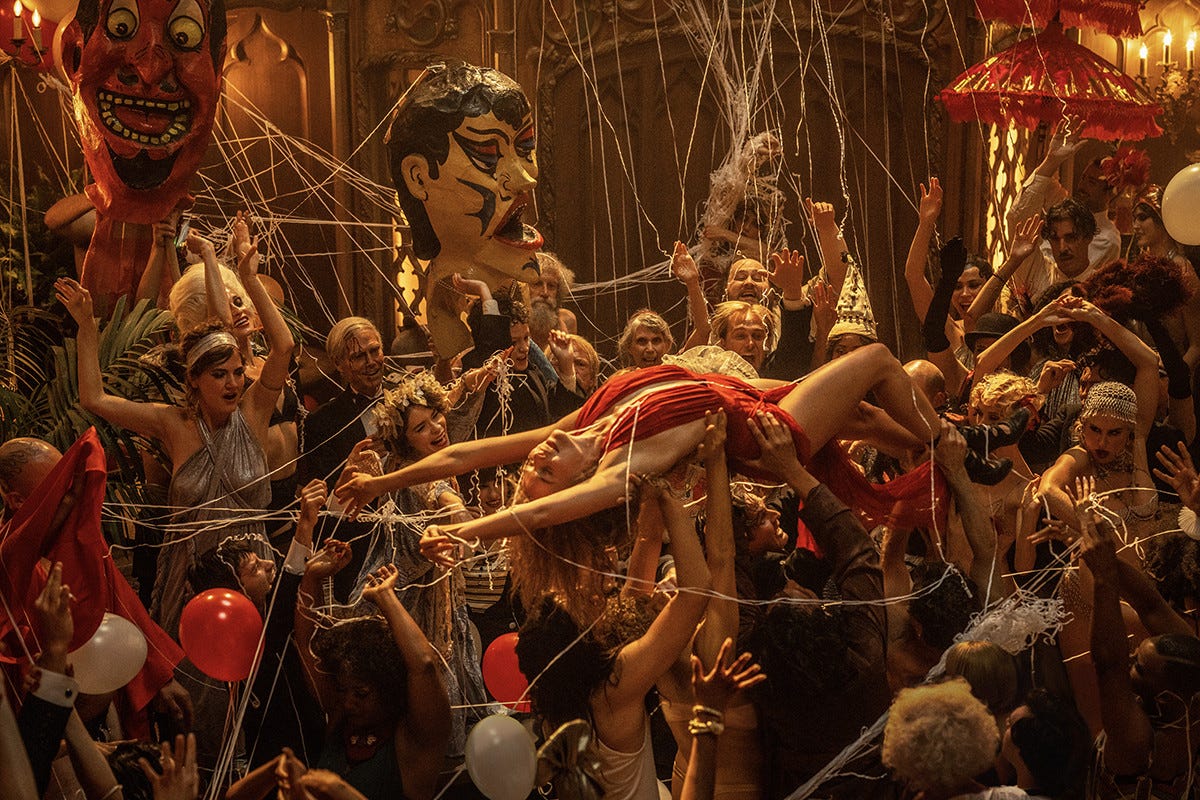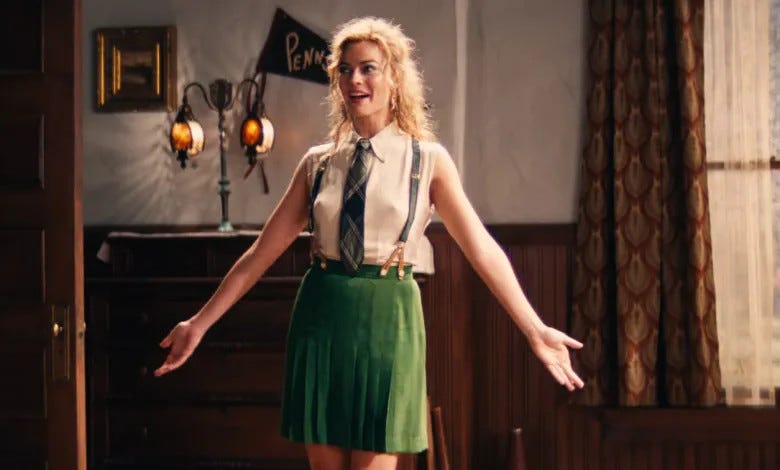NEW STANDARD DISCLAIMER: This newsletter aggressively spoils things.

Art is a strange beast. Sometimes a piece of art in any format can have all the look and feel of something terrific, and yet leave you cold. It looks like successful art, it feels like successful art—it smells, sounds, and tastes like it—but you walk away feeling unaffected. You didn’t precisely not enjoy yourself, but you also didn’t exactly enjoy yourself. You don’t think about it after you’re done consuming it. It becomes this Missing Time in your life—you know you spent some hours doing something that felt worthwhile in the moment, but when you try to focus in and nail down the memory it floats off like mist1.
This is how I feel about Babylon, written and directed by Damien Chazelle and starring Brad Pitt, Margot Robbie, and Diego Calva. I spent three hours of my life watching this film not too long ago. It already feels like a false memory incepted into my brain2.
It’s difficult to pin down exactly why this film had so little impact (although, yes, that three+ hour run time is a problem, though not necessarily a fatal one). But I think it has a lot to do with the fact that the film is essentially three stories that are supposedly connected, but fails pretty spectacularly to actually connect any of them. As a result, a lot happens off-screen, which makes the stuff we do see on screen feel weightless. And all of these problems could have been solved by reducing Brad Pitt’s character to a cameo3.
I Had a Good Run, Didn't I?
Pitt portrays Jack Conrad in Babylon, the biggest star in Hollywood at the fading edge of the Silent Era in 1926. Pitt, as usual, is delightful. I have no idea what Brad Pitt is like as a human being, in person, but as an actor he is reliably terrific and I always enjoy him in roles. He’s delightful here playing the affable, horny Jack who can’t stay faithful to a wife and who delights in throwing some ridiculously insane parties.
When sound comes to films, Conrad should be okay. He’s a huge star, and he has a good voice, and he’s not a terrible actor4. But his first forays into talking pictures are misfires that hurt his image and his box office, and before long he’s a dead letter as younger actors like Clark Gable come to take his roles. It’s a sad story, to be sure, and Pitt brings a certain level of pathos to the performance that makes Jack someone you mourn when they meet their fate.
The problem is, the movie really isn’t concerned with Jack. The story is really about Nellie LaRoy (Robie), an uncouth party-girl who makes an initial splash in Hollywood, and Manuel (Calva) the Mexican striver who falls in love with LaRoy and squanders his own professional success in a doomed effort to save and care for her. The Conrad character exists solely to bring these two characters together and provide Manny with a plausible rise in the film industry. Conrad, who Pitt portrays as a kind of easygoing savant5, takes a shine to Manny and puts him on the path to becoming a successful studio executive. This puts Manny in a position to stay connected to Nellie.
That’s all Conrad does in terms of plot in this film. Pitt gets a lot of screen time, though, and while Conrad’s ultimately tragic story is well-done and affecting—and thematically appropriate, as the whole film is about the way life turns into a slow, grinding parade of loss—it’s also completely unnecessary. Cut Pitt’s role down to a cameo and you not only get this movie in under two-and-a-half hours, you gain room for Nellie and Manny’s story to breathe6.
Listen Up, All You Big Dick Mister Men!
Manny and Nellie are the heart of this story, the whole point. They’re doomed in their own ways. Nellie is chaotic and impulsive and driven by her own emotional wounds, the sort of classic Hollywood Agent of Chaos that you know will destroy everything and everyone in her wake. Manny is a man defined by service to others—his whole life is just doing shit for people, generally the shit they don’t want to do. The moment he sees Nellie and falls for her it’s over, because they are a perfect pair: A woman who creates shit that needs taking care of, and a man defined by taking care of shit for people7.
Watching Manny rise in the movie business because he’s smart and capable is thrilling because you know that Nellie is lurking out there like a pretty, Margot-Robbie-shaped demon ready to crash into him and ruin him. Worse, Manny knows she’ll be the death of him and yet can’t resist. This is the core of the story; once Jack Conrad sets Manny in motion around Nellie there’s literally nothing more for Pitt’s character to do except look exceptionally good while becoming increasingly depressed8. It’s not that Conrad’s story isn’t interesting, it’s just not necessary to the rest of the film.
Because Conrad’s story takes up so much space without really contributing to the main story, the main story is compressed9. Much of Nellie’s meteoric rise and drug-fueled downfall happens off-screen, and Manny and Nellie spend so little time together it’s difficult to get a sense of how devoted he is to her—or why10. The whole film feels disconnected and airless because of this. Cutting Conrad’s story down would improve everything even if it would deprive us of Brad Pitt rockin’ a tuxedo.
Then again, what do I know? I don’t look good in a tuxedo, which I only know because of the one time in my life I wore one, which was my high school graduation. For reasons that now escape me11.
Next week: ‘Party Down’ and the allure of failure.
This basically describes every moment of my entire life and now if you’ll excuse me I have to go find someplace quiet to have a sit and a think about my life.
I am easily incepted. At this point more than half my intimate thoughts are just commercial jingles and celebrity catchphrases.
The fact is that Brad Pitt and I share the same problem: We’re super charming, but a little of us goes a looong way.
Also, he looks like Brad Pitt, which, let’s be honest: 90% of anyone’s success is how much they look like Brad Pitt.
I get the impression that Pitt himself is one of those likable doofuses for whom everything comes relatively easy, and since I am a man who breaks out into a panic just thinking about making a phone call this enrages me.
Also more room for shots of Margot Robbie’s nipples, which were apparently very thematically appropriate for director Damien Chazelle.
All great fiction rhymes. And if it manages to rhyme shit, you' know you’ve got something. Day drunk? Never in life, why do you ask?
Is Looking Exceptionally Good While Being Increasingly Depressed the title of my memoir? Only if Blondes, Bombs, and Bourbon is trademarked by someone else.
It takes skill to compress your primary narrative in a movie that is three fucking hours long.
Based on the screen time they get, one suspects the obvious answer: Margot Robbie’s nipples.
Very probably because the Jesuits threatened to beat me if I didn’t wear a rented tuxedo, because that was how the Jesuits got us to do everything.






Thems some nipples all right. Apparently her feet are also somewhat alluring. I just learned about that one on my local news station (WGN, Ch 9).